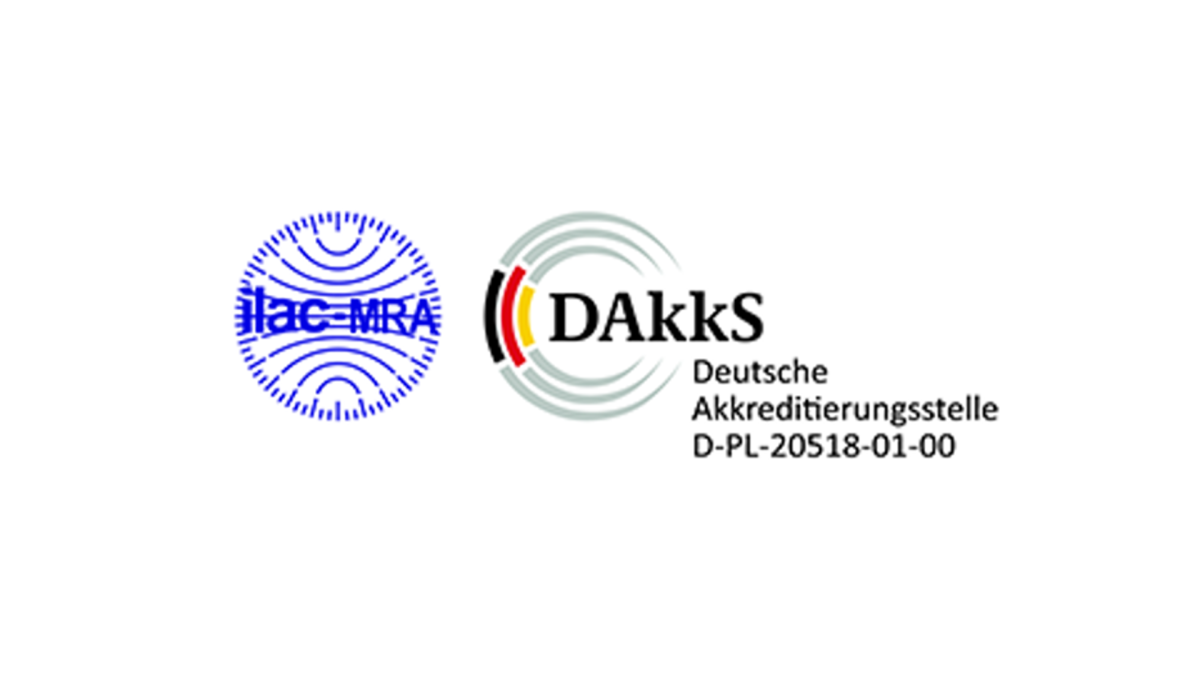Accreditation by DIN EN ISO/IEC 17025
Our testing laboratory has been accredited in accordance with DIN EN ISO/IEC 17025 since 2017. Therefore, our laboratory is subject to regular audits by the Deutsche Akkreditierungsstelle (DAkkS) to ensure that both our technical expertise and our technical equipment meet the highest standards.
What are the prerequisites for accreditation?
The prerequisite for accreditation as a testing laboratory is fulfilling the requirements of DIN EN ISO/IEC 17025. This standard not only sets requirements for the introduction of a quality management system, comparable to ISO 9001, but also goes beyond this by setting specific requirements for laboratory work. These range from fundamental principles such as impartiality to requirements for personnel, premises and testing equipment, as well as measurement uncertainty calculations and quality assurance measures. Compliance with DIN EN ISO/IEC 17025 ensures that the laboratories work to a comparable, high standard and deliver reliable results.
A certificate is all well and good, but what exactly does it represent?
In other words: What exactly do we do to ensure that you can trust us and our test results?
It is not a single tool or a single method that ensures that you can trust our test results. Rather, it is the interplay of various aspects you can rely on us:
- Quality management: Defining processes and procedures is one thing; implementing them in day-to-day business is another. The processes are brought to life in our laboratory. They have been optimised over the years to not only achieve maximum quality, but also to ensure continuous feasibility.
> More about our quality policy
- Expertise of personnel: We ensure the expertise of our personnel through various measures. This includes the training of materials testers, internal and external training courses and monitoring the expertise of our employees.
There is a high level of experience and routine in testing fasteners. With this expertise, we can not only guarantee flawless test results, but also provide you with the best possible advice.
> More about our team
- Reliable equipment: In addition to calibrating our test machines at set intervals, they are also maintained internally and/or externally on a regular basis. Regular checks are also carried out between calibrations with reference materials or standards.
- Quality assurance measures: To monitor our capabilities, we participate in comparative tests (where available, proficiency tests) with other laboratories with above-average frequency. This comparison enables us to grade our performance and, if necessary, implement improvements in the testing processes.
In addition to the detailed validation of new test procedures, other measures include the precise analysis of standardised procedures and the control and monitoring of room conditions (such as the ambient temperature at the installation site of the devices).
- Continuous improvement: Various methods contribute to continuous improvement. This includes regular internal audits, a system for submitting suggestions for improvement, consistent handling of complaints and corrective measures, and regular evaluation of the management system.
> More about our history
The Würth Industrie Service GmbH & Co. KG collects and processes the personal data provided in the form in order to process the requested request for you. Please note the mandatory fields in the forms. The legal basis for this processing, the absolutely necessary data, is Art. 6 para. 1 lit. b DSGVO, implementation of a pre-contractual measure. The processing of data voluntarily provided by you is carried out on the basis of Art. 6 para. 1 lit. f DSGVO. Thereafter, processing is permissible which is necessary to safeguard our legitimate interests. Our legitimate interest is to have contact with you, our customers, to improve our consulting quality and to be able to contact you more easily in case of possible queries. The data collected will only be stored by us for as long as is necessary to process your enquiry and to contact you. They are then deleted.
Supplementary data protection information, in particular regarding your rights to information, correction, deletion, restriction of processing, objection and complaint, can be found in our data protection declaration.


